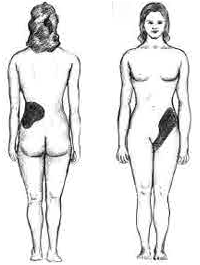Pyelonephritis
Pyelonephritis is an inflammation of the kidney, typically caused by a bacterial infection. It is a condition that falls under the specialties of infectious disease, urology, and nephrology. The most common causative organism is Escherichia coli. This condition requires prompt medical intervention to prevent complications such as sepsis or kidney failure.
Signs and Symptoms
The symptoms of acute pyelonephritis develop rapidly and typically include high fever, flank tenderness, and pain during urination. Patients may also experience nausea and frequent urination. In chronic cases, symptoms include persistent abdominal or flank pain, fever, unintentional weight loss, malaise, decreased appetite, and blood in the urine. Chronic pyelonephritis can lead to complications like AA amyloidosis due to the accumulation of inflammation-related proteins.

Causes and Risk Factors
Pyelonephritis is most commonly caused by bowel organisms that enter the urinary tract. E. coli is responsible for 70-80% of cases, followed by Enterococcus faecalis. Hospital-acquired infections may involve other bacteria like Pseudomonas aeruginosa and Klebsiella species. Risk factors include sexual intercourse, prior urinary tract infections, diabetes, structural abnormalities of the urinary tract, and spermicide use.
Diagnosis
Laboratory Examination
Diagnosis is typically based on symptoms and supported by urinalysis that shows the presence of nitrite and white blood cells. Blood tests like a complete blood count may show neutrophilia. Urine and blood cultures are useful for confirming the diagnosis and determining antibiotic sensitivity.
Imaging Studies
Imaging studies are recommended if there is no improvement with initial treatment or if kidney stones are suspected. A noncontrast helical CT scan is preferred for detecting stones, while kidney ultrasonography or voiding cystourethrography is used for identifying anatomical abnormalities.

Classification
Acute Pyelonephritis
This form involves purulent inflammation of the renal pelvis and kidney. The condition reveals abscesses in the kidney parenchyma and is characterised by neutrophils, fibrin, and cell debris.
Chronic Pyelonephritis
Chronic pyelonephritis leads to recurrent infections, causing scarring and impaired kidney function. Severe cases may result in perinephric abscesses or pyonephrosis.

Xanthogranulomatous Pyelonephritis
This rare form is characterised by granulomatous abscess formation and significant kidney destruction. It often mimics renal cell carcinoma and is associated with recurrent fevers, anaemia, and painful kidney masses.

Prevention
Preventive measures include urinating after sexual activity and maintaining adequate hydration. For individuals with recurrent urinary tract infections, long-term antibiotic therapy may be considered. In children, the benefits of long-term antibiotics are not conclusively proven. Cranberry products may also help reduce the incidence of UTIs in certain individuals.
Management
Antibiotics are the cornerstone of pyelonephritis treatment. In uncomplicated cases, oral fluoroquinolones like ciprofloxacin are commonly used. More severe cases may require hospital admission and intravenous antibiotics such as fluoroquinolones, aminoglycosides, or cephalosporins. Surgical intervention may be necessary for patients with structural abnormalities or stones causing urinary obstruction.
Simple
A systematic review recommended norfloxacin due to its low side effect profile and comparable efficacy. In areas with high antibiotic resistance, initial treatment may involve a single intravenous dose of a long-acting antibiotic followed by oral therapy.
Complicated
Hospitalised patients typically receive intravenous antibiotics and are monitored closely. The treatment regimen may include a combination of antibiotics based on susceptibility profiles. Intravenous fluids are administered to maintain hydration and optimise urine output.
Follow-up
If no improvement is observed within 48 hours, further urine analysis and imaging are warranted. Outpatients should check back with their healthcare provider for reassessment.
Epidemiology
Pyelonephritis affects approximately 1 to 2 per 1,000 women annually and just under 0.5 per 1,000 men. Young adult females are the most commonly affected group, followed by infants and the elderly. Xanthogranulomatous pyelonephritis is more common in middle-aged women but can present differently in children, sometimes being mistaken for Wilms' tumour.
Self-assessment MCQs (single best answer)
What is the most common causative organism of pyelonephritis?
Which of the following is NOT a typical symptom of acute pyelonephritis?
Which imaging study is preferred for detecting kidney stones in pyelonephritis?
Which form of pyelonephritis involves recurrent infections leading to scarring and impaired kidney function?
What is a common preventive measure for pyelonephritis?
In which patient population is pyelonephritis most commonly observed?
Which symptom is more commonly associated with chronic pyelonephritis as opposed to acute pyelonephritis?
What is the typical antibiotic treatment used for uncomplicated pyelonephritis?
Which of the following is a complication that can arise from chronic pyelonephritis?
What is the recommended approach if there is no improvement in pyelonephritis symptoms within 48 hours?
Dentaljuce
Dentaljuce provides Enhanced Continuing Professional Development (CPD) with GDC-approved Certificates for dental professionals worldwide.
Founded in 2009 by the award-winning Masters team from the School of Dentistry at the University of Birmingham, Dentaljuce has established itself as the leading platform for online CPD.
With over 100 high-quality online courses available for a single annual membership fee, Dentaljuce offers comprehensive e-learning designed for busy dental professionals.
The courses cover a complete range of topics, from clinical skills to patient communication, and are suitable for dentists, nurses, hygienists, therapists, students, and practice managers.
Dentaljuce features Dr. Aiden, a dentally trained AI-powered personal tutor available 24/7 to assist with queries and provide guidance through complex topics, enhancing the learning experience.
Check out our range of courses, or sign up now!


